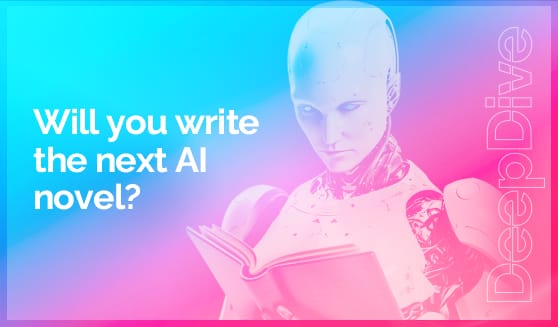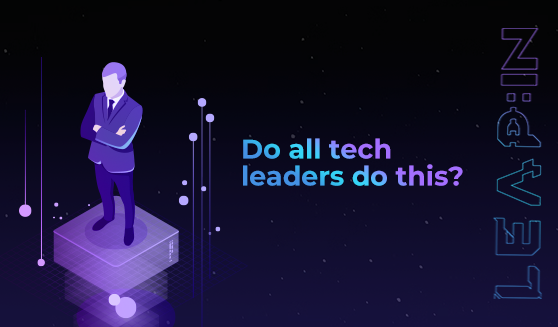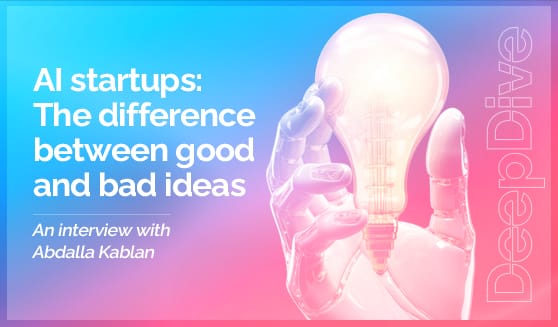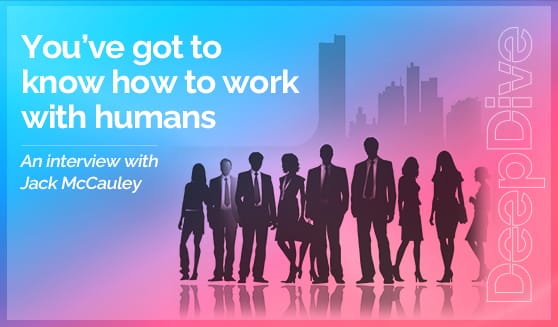
Welcome to the 118 new deep divers who joined us since last Wednesday. If you haven’t already, subscribe and join our community in receiving weekly AI insights, updates, and interviews with industry experts straight to your feed.
DeepDive
Your weekly immersion in AI.
Since ChatGPT was released in November 2022, AI has become a regular topic of conversation for everyone, not just techies. Every major movement in society drives a new wave of art – including new novels that focus on that movement, dissect it, and explore its potential to transform our world forever.
AI is no exception. As soon as we witnessed the early public reaction to ChatGPT, we knew a new era of AI lit was coming.
But it hasn’t happened as quickly as we expected. Now in 2024, we’re only just beginning to see glimmers of AI lit entering mainstream publishing. There’s a significant rise in the number of non-fiction books about AI – but not fiction. And that’s got us wondering why.
Is the general reading public not yet ready for AI themed novels? Are publishers holding off and waiting for the AI landscape to settle before they decide which AI fiction to publish? Or are authors themselves not yet sure how they feel about artificial intelligence?
Annie Bot by Sierra Greer
Annie clenches her hands together on her lap. She directs her gaze at Doug’s shoes, at his neatly tied shoelaces. “I’m sorry,” she says.
“Have you apologized before?” Monica asks. Annie nods.
“What does that mean to you, to say you’re sorry?”
In the above excerpt from Annie Bot, a novel by author Sierra Greer published in March 2024, Annie (an AI) and Doug (her human boyfriend) are in couples therapy. You’d be forgiven for thinking a novel about a man and his AI partner should probably be about the man – but this novel is really about Annie, and her experience of navigating existence with increasingly complex experiences and emotions.
It’s an insightful, funny, and surprisingly relatable exploration of what it means to be human. And we couldn’t help falling a little bit in love with Annie – in spite of the fact (or perhaps because of the fact) that she’s a machine.
But it’s one of only a handful of AI novels hitting the bookshelves
Far from an AI fiction explosion, we’re seeing just a tiny smattering of AI novels making it through the traditional publishing (as opposed to self-publishing) process.
One of the reasons for this might be that the people most qualified to write authentic novels about artificial intelligence are…well, not writing novels. They’re working in the AI sector instead.
Historically, the best sci-fi writers have often been scientists and technologists. So we think it’s time that AI experts turned their hand to fiction – because you are the people who can write informed, optimistic, and visionary stories about how this technology could change the world.
Will AI lit just capitalise on the moment – or is it an important part of tech adoption?
When the AI lit market does surge (and we still think it will), there will be two forces at play.
One is the power of sales: the publishing industry will capitalise on AI’s prevalence in culture and publish AI lit because they know it’ll sell. To an extent, authors will be doing the same thing – although you could argue that authors have been writing about AI for ages, they just haven’t got publishing deals quite so easily.
And the second is the power of art and culture to help people understand, accept, and adopt new ideas. At every turning point throughout history, creative work has helped to embed cultural shifts into the collective consciousness of a society – and right now, novels that focus on AI could help more people look closely at AI in a relatable, accessible way.
That means readers can develop their own opinions about AI, look at it from different angles (instead of getting stuck in the viewpoint of their immediate community), and figure out how they feel about the rise of intelligent tech.
We need AI experts to write the novels
Because let’s face it – the majority of non-techie writers don’t have the depth of knowledge and understanding about the intricacies of AI to do it justice. And maybe that’s why publishers aren’t investing in AI novels yet.
AI is having a moment – and that’s probably (at some point) going to help publishers sell books. But books will also help AI to become integrated into public awareness and (perhaps) accepted as a meaningful part of our lives.
So for us, with a positive view of how our future could look with AI, we hope that at least a few of the knowledgeable AI leaders we meet will decide to write a novel. We’d certainly read it (and we’d feature it here in the DeepFest newsletter too, just so you know).
What do you think?
Open this newsletter on LinkedIn and share your thoughts in the comment section. Do you like AI lit? Do you think it helps or harms the AI sector? And what’s your favourite piece of AI fiction so far?
And finally, if you do decide to write a novel about AI, keep us in the loop. We want to know.
Did you miss DeepFest 2024? Don’t worry – register now to secure your place at the 2025 edition. We can’t wait to see you there.








